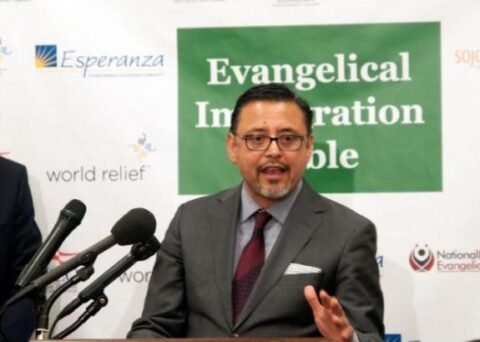Reform

Even Evangelicals Agree: Congress Needs to Take Action on Immigration
DREAM Act students, immigration advocates and community leaders have turned up the heat on Congress and the Obama administrative in recent weeks to do something, anything, about our nation’s immigration problems. Yesterday, Evangelical leaders—including the National Association of Evangelicals, and Focus on the Family—joined that effort, denouncing recent “self-deportation policies” and calling on leaders to break the gridlock on immigration. Read More

Administration Takes Step to Keep Talented Foreign Students in the U.S.
BY HEATHER M. STEWART, COUNSEL AND DIRECTOR OF IMMIGRATION POLICY AT NAFSA: ASSOCIATION OF INTERNATIONAL EDUCATORS. Current U.S. immigration law provides few options for foreign graduates of U.S. universities with degrees in science, technology, engineering, and math (“STEM” degrees) who want to stay here to contribute their skills and knowledge. Not enough American students are interested in these fields, even as employers regularly cannot find enough people with the high-tech and scientific knowledge and skills they need to fill available positions. Luckily for the United States, international students seek out these majors and excel in them. But increasingly, we lose these talented graduates to other competitor countries where immigration laws are friendlier. This is, of course, an enormous loss to the U.S. economy, as international students with STEM degrees often create successful businesses and jobs in the United States. Last week, DHS took a strong step forward by expanding the list of STEM fields for foreign graduates applying to training programs after graduation. Read More

Young, Professional DREAMers Deserve Recognition
Earlier this week, numerous media outlets covered the story of Jose Godinez-Sampiero, a DREAM Act-eligible law school graduate whose application for a law license is currently pending before the Florida Supreme Court. Similar stories are playing out in California and New York, as young people brought to this country as children are now law school graduates, trying to make use of their professional degrees. The problem isn’t just for young lawyers, however, but is faced by many DREAMers, such as Dulce Matuz, an engineer turned DREAM Act advocate, who made Time Magazine’s Top 100 list this week. Read More

Non-Deportable Immigrants Languish in Alabama Detention Center at Taxpayers’ Expense
Immigration violations are civil, not criminal infractions. But for many non-criminal immigrant detainees living alongside criminal inmates at the Etowah County Detention Center in Alabama, that distinction carries little meaning. Far removed from families and legal orientation programs, many of the 350 immigrant detainees housed at the Etowah Detention Center have received deportation orders, but for various reasons cannot be deported. Many are serving the maximum allowable time in detention, and are doing so under poor living conditions at a great cost to American taxpayers. In fact, a recent report by the Women’s Refugee Commission reveals that ICE continues to operate facilities like Etowah that fail to meet even its own detention standards. Read More

DREAM Advocates Begin a 3,000-mile March from California to Washington
Jose Gonzalez was born in Guadalajara, Mexico in 1987, but he has called California home for almost all of his 25 years. A community college graduate, as well as a youth minister in his church, Jose wants to attend a four-year university, but his family cannot afford tuition, and he cannot work to pay his own way. Like many others in his situation, Jose grew up as an American—speaking English, attending school, thinking about college and careers—only to learn one day that his presence here is not legal. Read More

Civil Rights Leaders Speak Out Against Alabama’s “Vile” Immigration Law
Late last week, thousands gathered on the steps of Alabama’s capitol building to hear civil rights leaders—Rev. Jesse Jackson, Rev. Al Sharpton, Martin Luther King III and Wade Henderson of the Leadership Conference on Civil and Human Rights, among others—speak out against the state’s extreme immigration law, HB 56. Although key provisions of Alabama’s law have been enjoined by federal courts, the law still requires police to verify the immigration status of anyone stopped or arrested whom they suspect is in the country without documents. The leaders, who were also protesting a new voter ID law, called HB 56 the “most vile” law in the country. Read More

Cato Institute Analyzes the Benefits of Immigration for the United States
The Winter 2012 issue of the Cato Journal is devoted to answering a single question: “Is Immigration Good for America?” In 13 articles, 16 scholars answer with a resounding “Yes!” The consensus is that immigrants provide a net benefit to the U.S. economy and to U.S. workers. There is also a consensus among the authors that the current immigration system, with its patchwork of arbitrary numerical caps, needlessly squanders the full economic potential of immigration. The authors call for a thorough revamping of the immigration system to make it more responsive to labor demand, to attract highly skilled professionals and entrepreneurs, and to offer a pathway to legal status for the unauthorized population. Read More

Following State of the Union, President Obama Needs to Follow Through on Immigration Reforms
The President’s State of the Union address this week re-iterated some of his key themes on immigration—support for comprehensive reform, dismay that DREAM Act students and foreign students educated in this country have no way to legalize their status, and a belief that he’s done enough to the secure the border. More importantly, he framed these themes in context to America’s economic recovery, innovation and growth. However, while any mention of immigration in the State of the Union is welcome, it’s what the President didn’t say that may have more of an impact on how his administration is remembered this year on immigration—and how his vision is measured by voters in the coming election. Read More

New Report Says Legalization Would Result in $1.4 billion in Revenues for Houston, Texas
A new report issued this month by the Greater Houston Partnership (GHP), a business advocacy organization, confirms that legalization of unauthorized workers would result in those workers earning higher wages and paying more taxes. Potential Tax Revenues from Unauthorized Workers in Houston’s Economy uses data from the Pew Hispanic Center to estimate the number of unauthorized immigrant workers, by industry, in the Houston area. Then, assuming that legalized workers would earn the prevailing wage in their industry, GHP estimates their projected incomes to which it applies the standard tax rate. Read More

USCIS Seeks to Unify Families Facing Separation through Revised Waiver Process
Today, the administration took another important step toward fixing one of the most notorious problems with our broken immigration system—the 3 and 10 year bars. The U.S. Citizenship and Immigration Services (USCIS) announced today that it was filing a notice of intent to change a rule which would streamline the application process for many relatives of U.S. citizens currently eligible for permanent resident status, thereby minimizing the amount of time that applicants would have to be away from their families before being admitted into the United States. Read More
Make a contribution
Make a direct impact on the lives of immigrants.
